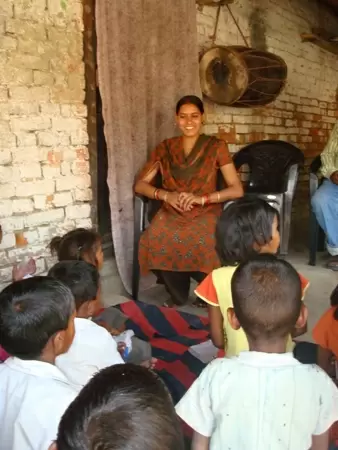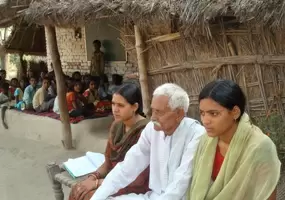A child of Mallahipurva, Guidya dared to change the village in Sonia Gandhi's constituency

29-September-2011
Vol 2 | Issue 39
Meet her and the first thing that will strike you is her dazzling smile and the long red streak of 'sindoor' (vermillion) in her hair. But Gudiya, 21, is no ordinary woman. Hers is a story of courage and change that she initiated in her native Mallahipurva village, located 150 kilometres from Uttar Pradesh's state capital, Lucknow.
Mallahipurva is a perfect example of neglect and deprivation, even though it falls in the Rai Bareilly district, the high-profile constituency of Congress party supremo, Sonia Gandhi.
 |
|
Breaking barriers: Gudiya broke caste barriers to teach children from so-called lower castes at her home (Photos: Women’s Feature Service)
|
Dominated by mallahas, an impoverished lower caste fishing community, education was the last thing that children here had access to and women were only seen as extra working hands to make fishing nets and moonj (jute) ropes.
An added curse was the rampant production and consumption of country liquor made from the abundant Mahua flowers of the region.
It's here that Gudiya ushered in change - by establishing a small school. She says, "I grew up in an environment where girls had no hope of ever leading a respectful life; even their mothers were alcoholics.
“The village boys too saw no scope in building a future and took to drinking early and aimlessly whiling away their time. Life was really tough. Just to get a square meal a day my parents had to make all of us work."
Then when the mid-day meal scheme began in a nearby school, Gudiya was sent there so that she would get something to eat. "When I went to school, I realised what a wonderful thing education is and I decided to continue going to school," she states.
Once her mind was made up, there was no turning back for this youngster, who hails from the only Brahmin family in the village and is one of 10 children - five girls and five boys.
But to begin, she had to get her father, Babu Lal Sharma, to agree to her continuing her schooling. "It was not easy to convince my father. He had put me on the job of spinning the 'moonj' ropes, which when sold got us some money to feed our family. But I didn't back down and eventually he gave in," she recalls.
Gudiya paid for her schooling by spinning rope in her free time and her single-minded dedication was rewarded when she became the first girl in Mallahipurva to pass the Senior Secondary Certificate (SSC) exam in 2008.
Today, Babu Lal says, "I was tongue-tied when I heard the news and saw the SSC certificate. It was a source of both happiness and apprehension for me. People in the village kept telling me that I was wrong in allowing her to do all this, but my heart said that this was her destiny, that she was meant to do this."
But passing an examination was not Gudiya's sole ambition. She had bigger plans - she wanted to start a small school for all those children who could not afford formal education.
When she spoke to the village elders about it and asked that some dedicated space be given to her to run the school, they flatly refused. So she once again went to her father to seek permission to allow Mallaha children into their home.
Being Brahmins this was considered not just sacrilegious by her parents but was also expressly prohibited by local religious heads. Nevertheless, Gudiya managed to coax consent out of her parents and she set up a class in the family verandah.
The next big hurdle was getting children to come. With over 90 families living in Mallahipurva and almost all the parents being addicted to country liquor, getting them to send their children to study was not easy.
"I went from house to house collecting children and getting them to class. Their parents were not happy and resisted my entreaties, but I never gave up. Then when a scheme called Child to Child Education was introduced by a New Delhi-based organisation, Girija Devi Foundation, I signed up for it and attached my school to it. That helped me get books, food and even medical aid all free of cost for all those who came to study. Owing to this, support from parents too began to grow," elaborates Gudiya.
 |
|
Nice family: Gudiya, along with her father, Babu Lal Sharma, and sister, Soni, outside the school that is run from the verandah of their home
|
Today, Gudiya has married and moved to Kanpur, but she continues to keep a tab on what's happening at her school, after she handed its reins over to her younger sister, Soni. "My sister too has studied up to Class VIII and is handling the school very well," she says with a smile.
This school has proved to be a great hit with the students, who quickly finish up their household chores and rush to Gudiya didi's classes - they are still called that.
What makes the classroom doubly important is the fact that children with any medical problem can receive immediate and free treatment - thanks to the education project.
Young Nita, not yet ten, recently underwent an eye surgery through the medical aid provided for the children at the school. She says Gudiya's school has changed her life. "Before the operation I had a squint and could not see very clearly. I used to overhear my mother tell my father that I would never get married because of the way I look and would have to work all my life spinning ropes and chopping fodder for the cattle. Then I joined school and during the medical check up the doctor suggested an operation to correct the squint. Now I can see and read properly and don't feel shy about meeting people," she says.
There are noticeable changes in the attitude of the local community as well.
Says Gudiya, "In the beginning I had faced a lot of ridicule and hostility. Some even threatened me and my family, saying that I was ruining the established way of life in the village. The same people, however, are now supportive.
“Earlier, the children were completely neglected - they would not eat food on time, wash or dress properly. There was a lack of sanitation that contributed to illnesses. Since both parents used to get drunk from the morning onwards, there was no one to take care of the kids. Now, over the last two years, the children have learnt a lot and come to school neat and clean. They know how to take care of themselves and their siblings as well."
Adds Nanhu, former Pradhan of Mallahipurva, "The school has definitely made a difference. People still consume Mahua liquor but they have understood that their children should not do the same. Some have even started giving up their drunken ways and make sure to bring their children to the school at Gudiya's home. I hope this change continues."
Gudiya, who is expecting her first child, has now enrolled in a Kanpur college for her further studies. But she has great hopes not just for herself but for her students, "I hope that one day each child from this school takes on the responsibility to teach others."
This young woman, who became a teacher almost by accident, has understood clearly the difference a dedicated teacher can make. - Women’s Feature Service















